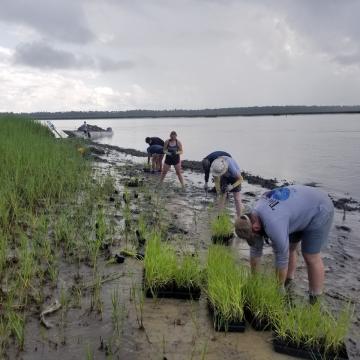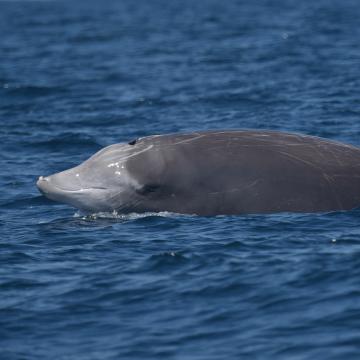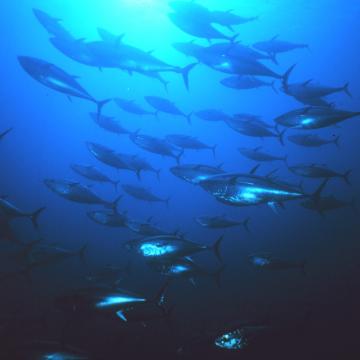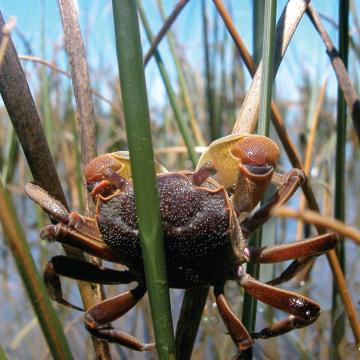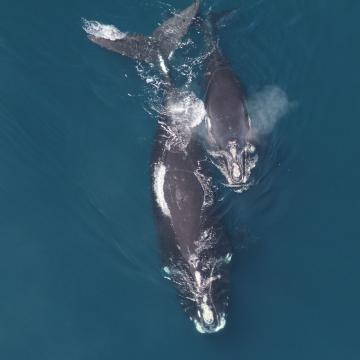-
NewsA new paper outlines some of the greatest coastal restoration successes in recent decades and identifies lessons we can learn from them to protect and restore similar environments worldwide.
-
NewsIn 2017, a Cuvier’s beaked whale that had been tagged by a team of Duke University marine scientists dove deep into the waters off Cape Hatteras, N.C, and stayed below the surface for 3 hours and 42 minutes before coming up for air – making it the longest whale dive ever recorded.
-
NewsActing like high-rise timeshares in the sea, shipwrecks and other artificial reefs can support dense populations of sharks, mackerels, barracudas, jacks and other large migratory marine predators essential to ocean health, according to a new study at 30 sites along the North Carolina coast.
-
NewsInteractive software that “reads” and analyzes footprints left by black rhinoceroses can be used to monitor the movements of the animals in the wild, giving conservationists a new way to keep watch on the endangered species and help keep it safe from poachers, according to a Duke University-led study.
-
NewsA new study finds that dolphin-viewing tours are more profitable than tours where customers can swim with the animals – a much more disruptive option that can deprive spinner dolphins of rest and inhibit their ability to avoid predators while foraging in nearby waters at night.
-
NewsGovernments might be able to prevent future pandemics by investing as little as $22 billion a year in programs to curb wildlife trafficking and stem the destruction of tropical forests, a new analysis by an international team of scientists and economists shows.
-
NewsSalt marshes, seagrass meadows and other coastal ecosystems are in rapid decline around the world. Restoring them is expensive and often unsuccessful. But an international team of researchers has discovered a way to sharply increase the odds of success by using biodegradable mats.
-
NewsScientists at Duke University are harnessing the power of big data and geospatial analysis to create new ways to track the effects of climate change on species and food webs.
-
NewsA newly discovered species of wasp, native to the cloud forests of Colombia’s tropical Andes, has been named in honor of Duke University conservation scientist Stuart Pimm.
-
NewsThe Migratory Connectivity in the Ocean (MiCO) system, an online open-access global database that maps the movements of sea turtles, whales, sea birds and other migratory species through the open ocean, has been awarded the 2020 Innovation Award by the Ocean Awards program.
-
NewsThe Duke University Wetland Center is marking its 30th anniversary this year by kicking off the largest expansion of research, teaching and outreach programs in its history.
-
NewsResearchers have found high concentrations of selenium in stream insects when they fly out of the water and the spiders that eat them downstream from a mining coal site in southern West Virginia, an indication that the contaminant moves from water to land as it makes its way up the food chain.
-
NewsScientists at Duke University’s Marine Geospatial Ecology Lab and other leading marine research institutions worldwide have created an open-access online database that maps the movements of migratory species through the open ocean.
-
NewsAs new moms, North Atlantic right whales tone down their underwater vocalizations and “whisper” to their young calves to avoid attracting predators, a new study by scientists at Syracuse University, Duke University and NOAA Fisheries’ Northeast Fisheries Center finds.
-
NewsLocal conservation can boost the climate resilience of coastal ecosystems, species and cities and buy them precious time in their fight against sea-level rise, ocean acidification and warming temperatures, a new paper by scientists at Duke University and Fudan University suggests.
